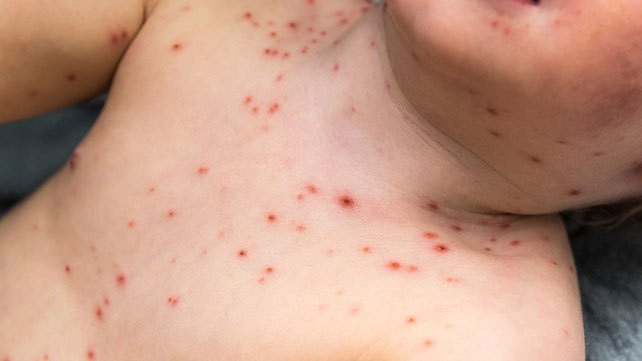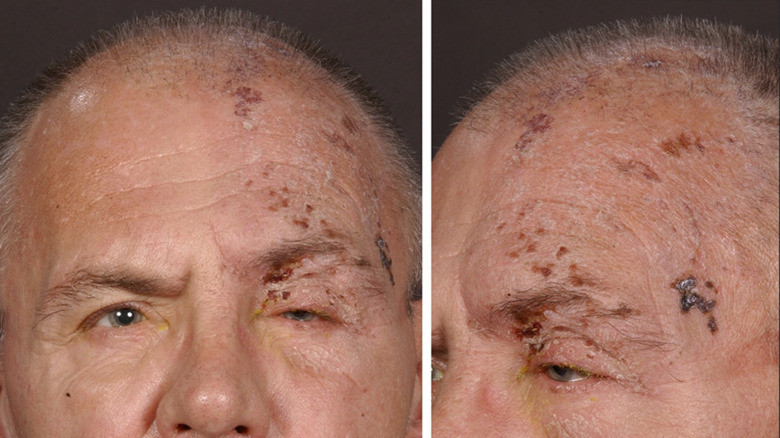Definisi
Cacar Air atau varicella zoster (chickenpox) merupakan penyakit infeksi virus Varicella zoster yang sangat menular yang ditandai dengan bercak merah hingga lenting kecil berisi air yang terkadang terasa gatal hingga nyeri. Pada kebanyakan orang, mengalami cacar air memberikan imunitas seumur hidup. Namun, tetap ada kemungkinan untuk mengalami lebih dari satu kali meskipun jarang. Cacar air termasuk penyakit yang mudah menular dari penderita ke bukan penderita atau orang yang belum pernah mengalami cacar air atau belum mendapatkan vaksin varicella.
Angka kejadian cacar air terbanyak ditemukan pada kelompok usia 4-10 tahun, walaupun cacar air juga bisa terjadi pada orang dewasa. Laju infeksi cacar air diperkirakan mencapai 90% sehingga disebut sebagai infeksi yang sangat menular. Apabila terjadi pada usia dewasa, biasanya cacar air yang terjadi dapat meninggalkan bekas luka yang lebih dalam dan lebih menghitam dibandingkan saat usia anak.
Saat ini sudah ada vaksin varicella yang tersedia dengan berbagai merk di Indonesia untuk melindungi anak-anak hingga dewasa dari cacar air. Vaksin yang ada memiliki keamanan yang baik, dan merupakan salah satu cara untuk mencegah hingga melindungi anak dari munculnya infeksi hingga komplikasi yang bisa muncul.
Penyebab
Cacar air disebabkan oleh virus Varicella zoster (VZV). Virus ini menyebar dengan mudah dari penderitanya ke orang lain yang belum pernah menderita cacar air atau belum pernah divaksinasi. Saat seseorang mengalami cacar air, sekitar 90% orang di dekatnya yang tidak memiliki imunitas terhadap cacar air akan tertular. Penyebaran virus terjadi terutama melalui kontak langsung dengan penderita. Virus ini juga mudah menular dari droplet, yang dapat tersebar dari:
- Air liur
- Batuk
- Bersin
Penderita cacar air dapat menularkan virus mulai dari 1-2 hari sebelum ruam dan lenting muncul sampai seluruh ruam telah menjadi keropeng. Orang yang sudah tervaksinasi mungkin akan mengalami ruam yang tidak berubah menjadi keropeng. Mereka dianggap tidak menularkan virus lagi setelah 24 jam tidak ada kemunculan ruam baru.
Selain menyebabkan cacar air, VZV juga menyebabkan herpes zoster atau cacar ular. Setelah menyebabkan cacar air, virus akan diam di dalam tubuh. Herpes zoster terjadi ketika virus yang diam tersebut aktif kembali. Orang dengan herpes zoster dapat menyebarkan virus kepada orang yang belum pernah mengalami cacar air ataupun belum vaksinasi. Penularannya terjadi melalui kontak langsung dengan cairan dari lepuhan herpes atau menghirup partikel virus yang berasal dari lepuhan tersebut. Orang yang tertular dari herpes zoster akan menderita cacar air terlebih dahulu, tidak langsung herpes zoster.
Faktor Risiko
Orang yang belum pernah mengalami cacar air atau belum mendapatkan vaksinnya berisiko terserang penyakit ini. Beberapa faktor risiko yang dapat meningkatkan kerentanan seseorang untuk terinfeksi VZV, di antaranya:
- Pernah berkontak atau terpapar dengan penderita cacar air
- Usia di bawah 12 tahun
- Orang dewasa yang tinggal bersama dengan anak-anak
- Menghabiskan waktu yang lama di sekolah atau fasilitas anak
- Memiliki sistem kekebalan tubuh yang buruk akibat penyakit atau pengobatan tertentu
Apabila anda sudah pernah mengalami infeksi varicella sebelumnya atau pernah mendapatkan vaksinasi, maka risiko Anda mengalami varicella akan berkurang.
Gejala
Gejala cacat air muncul sekitar dua minggu (berkisar antara 7 sampai 21 hari) setelah terpapar virus dari penderita cacar air atau herpes zoster. Cacar air biasanya berlangsung sekitar 4 sampai 7 hari. Gejala klasiknya adalah ruam yang berubah menjadi lenting kecil berisi cairan yang gatal. Setelah 1-2 hari mengalami gejala-gejala di atas, bercak merah yang klasik baru bermunculan dan biasanya memiliki tiga tahapan hingga akhirnya sembuh. Pertama, tampak bintil yang berwarna merah atau merah muda. Kedua, bintil tersebut berubah menjadi lenting berisi air yang mudah pecah. Ketiga, bintil menjadi berkerak, dan mulai menghilang hingga sembuh. Bila penderitanya sering menggaruk bintil kulit, bintil-bintil tersebut bisa terinfeksi lagi oleh bakteri.
Sebelum ruam muncul, dapat muncul gejala-gejala flu sekitar satu sampai dua hari sebelumnya. Gejala tersebut antara lain:
- Demam
- Kelelahan
- Penurunan nafsu makan
- Sakit kepala
Diagnosa
Dokter biasanya mendiagnosa cacar air berdasarkan karakteristik ruam. Jika terdapat keraguan dalam mendiagnosis, varicella dapat dikonfirmasi dengan pemeriksaan laboratorium yang meliputi pemeriksaan darah atau kultur sampel cairan ruam. Diagnosis cacar air harus dilakukan oleh dokter karena memerlukan penanganan yang khusus
Sebaiknya Anda beritahu dokter bila Anda atau seseorang di keluarga Anda sedang atau pernah mengalami cacar air sebelumnya. Informasi seperti kapan pertama kali gejala muncul juga akan membantu dokter mendiagnosis dan menentukan penanganan terbaik pada saat pasien pertama kali diperiksa oleh dokter.
Tata Laksana
Penanganan untuk cacar air ditujukan untuk meringankan gejala yang timbul. Kebanyakan kasus varicella akan disarankan untuk ditangani gejala-gejala yang ada dengan beberapa obat tertentu. Pengobatan dan terapi cacar air dapat dilakukan dengan mengisolasi pasien di rumah atau pun di rumah sakit.
Perawatan di Rumah
Orang tua yang memiliki anak dengan cacar air diminta agar anak tidak sekolah terlebih dahulu untuk mencegah penyebaran. Pasien dewasa dengan varicella juga diminta untuk beristirahat terlebih dahulu di rumah hingga sembuh untuk menghindari terjadinya penularan pada orang lain. Dokter juga akan memberikan edukasi untuk menghindari kebiasaan menggaruk atau menggosok area yang gatal.
Terdapat beberapa hal yang dapat dilakukan di rumah untuk membantu meringankan gejala dan mencegah infeksi kulit. Pemakaian lotion kalamin dan berendam pada air sejuk yang ditambahkan soda kue, oatmeal yang belum dimasak, atau oatmeal koloid dapat membantu meringankan gatal. Potonglah kuku menjadi pendek dan sebisa mungkin tidak menggaruk ruam untuk mencegah penyebaran virus ke tempat lain dan untuk mencegah infeksi kulit. Jika Anda tidak sengaja menggaruk lepuhan, segera cuci tangan dengan sabun dan air setidaknya selama 20 detik.
Obat-obatan
Biasanya dokter akan memberikan obat pereda gatal berupa bedak asam salisilat pada lenting yang belum pecah, dan obat pereda nyeri seperti paracetamol bila diperlukan. Obat-obatan over the counter (OTC) juga dapat dibeli untuk meringankan gejala. Namun, penggunaan aspirin atau obat yang mengandung aspirin tidak direkomendasikan. Pemakaian aspirin pada anak dengan cacar air dihubungkan dengan kejadian sindrom Reye’s, sebuah penyakit yang menyerang hati dan otak yang dapat menyebabkan kematian. Obat yang dapat dipakai adalah parasetamol sebagai obat penurun panas. American Academy of Pediatrics (AAP) merekomendasikan untuk tidak menggunakan ibuprofen jika mungkin karena penggunaannya dihubungkan dengan infeksi bakteri pada kulit yang mengancam nyawa.
Dokter akan meresepkan obat sesuai dengan keadaan masing-masing orang. Obat antivirus direkomendasikan untuk penderita yang berisiko mengalami komplikasi serius, seperti:
- Orang sehat berusia lebih dari 12 tahun
- Orang dengan penyakit kulit atau paru kronis (jangka panjang)
- Orang yang menjalani terapi salisilat atau steroid jangka panjang
- Wanita hamil
- Orang dengan kelemahan sistem imun
Terdapat beberapa antivirus yang sudah disetujui untuk menangani varicella. Obat ini bekerja paling baik jika diberikan secepat mungkin, terutama saat 24 jam pertama setelah ruam muncul.
Obat antivirus yang diberikan bukan bertujuan untuk menyembuhkan cacar air. Antivirus tersebut ditujukan untuk meringankan gejala dengan menghambat aktivitas atau kerja virus di dalam tubuh. Hal inilah yang membantu sistem pertahanan tubuh untuk bekerja dengan optimal dan dapat sembuh lebih cepat.
Komplikasi
Cacar air dapat mengakibatkan komplikasi, namun tidak umum pada orang yang sehat. Beberapa komplikasi yang dapat terjadi apabila mengalami varicella adalah bercak atau lenting dapat menyebar hingga ke mata sehingga menganggu proses penglihatan. Selain itu, bercak juga dapat berwarna lebih merah, lebih nyeri dan lebih hangat diraba yang memungkinkan sudah adanya keterlibatan infeksi bakteri. Terkadang bercak atau lenting yang ada disertai dengan keluhan pusing berputar atau sulit bernapas.
Orang yang lebih berisiko untuk mengalami penyakit yang serius dan berisiko tinggi mengalami komplikasi adalah:
- Bayi
- Remaja
- Orang dewasa
- Wanita hamil. Apabila seorang ibu hamil mengalami varicella, anak yang dikandung dapat mengalami kecacatan fisik berupa pertumbuhan yang terhambat, ukuran kepala yang kecil, masalah mata, atau gangguan intelektual/kognitif. Selain itu, komplikasi lain yang dapat timbul adalah infeksi pada otot jantung dan nyeri atau bengkak pada persendian.
- Orang dengan penurunan sistem imun akibat penyakit atau obat-obatan, misalnya:
- Penderita HIV/AIDS
- Penderita kanker
- Pasca transplantasi organ
- Penerima kemoterapi, obat-obatan penekan sistem imun, atau pengguna obat steroid jangka lama
Komplikasi serius varicella yang dapat terjadi adalah:
- Infeksi bakteri pada kulit dan jaringan lunak pada anak, termasuk infeksi bakteri Streptococcus Grup A
- Infeksi paru-paru (pneumonia)
- Infeksi atau pembengkakan otak
- Perdarahan
- Infeksi darah (sepsis)
- Dehidrasi
Beberapa orang mengalami komplikasi serius dari varicella sampai perlu perawatan di rumah sakit. Komplikasi paling fatal adalah kematian, namun sudah sangat jarang terjadi karena program vaksinasi yang sudah terlaksana. Kematian biasanya terjadi pada anak-anak dan orang dewasa sehat yang tidak divaksinasi.
Pencegahan
Cara terbaik untuk mencegah cacar air adalah dengan mendapatkan vaksin. Semua orang, termasuk anak-anak, remaja, dan orang dewasa harus mendapatkan dua dosis vaksin varicella jika belum pernah mengalami penyakit ini atau belum pernah divaksinasi.
Vaksin varicella sangat aman dan efektif dalam mencegah penyakit. Sebagian besar orang yang sudah divaksinasi tidak akan menderita penyakitnya. Apabila seseorang yang sudah tervaksinasi memang tertular, maka biasanya penyakit akan lebih ringan dengan ruam yang lebih sedikit, terkadang tanpa lepuhan berisi cairan melainkan hanya bercak merah dan disertai demam yang rendah atau tanpa demam. Hampir semua orang yang divaksinasi varicella tidak mengalami penyakit yang berat.
Meskipun begitu, tetap ada orang yang sudah tervaksinasi yang mengalami tingkat keparahan penyakit yang sama dengan orang yang belum divaksinasi.
Setelah mengenali beberapa faktor risiko yang anda miliki, langkah berikutnya adalah perbaikan faktor risiko yang dapat diperbaiki. Berikut langkah-langkah yang dapat anda lakukan:
- Hindari kontak atau paparan dengan seseorang yang diduga mengalami varicella
- Melakukan vaksinasi varicella yang sudah ada di pasaran
- Hindari memakai pakaian yang kasar terutama bahan wool pada area yang gatal karena dapat memicu garukan
- Menjaga kuku tetap pendek dan memakai sarung tangan apabila diperlukan untuk mencegah Anda dari menggaruk sehingga risiko infeksi bakteri sekunder akibat garukan dapat terhindar
- Jangan lupa untuk mengikuti regimen obat Anda sesuai arahan dokter
Kapan Harus ke Dokter?
Jika Anda terpapar varicella zoster atau herpes zoster, sebaiknya Anda berkonsultasi dengan dokter jika:
- Anda belum pernah mengalami varicella zoster atau belum vaksinasi
- Anda sedang hamil
- Anda memiliki sistem imun yang lemah
Jika Anda mengalami gejala varicella, maka Anda harus berkonsultasi ke dokter. Hal ini terutama penting pada:
- Orang yang berisiko mengalami komplikasi serius karena berusia kurang dari satu tahun, berusia lebih dari 12 tahun, memiliki sistem imun yang lemah, dan hamil
- Adanya gejala seperti:
- Demam yang sudah berlangsung lebih dari 4 hari
- Demam yang melebihi 38.9 celcius
- Ruam yang menjadi sangat merah, hangat, nyeri, atau mengeluarkan nanah. Hal ini dapat menandakan adanya infeksi bakteri
- Sulit dibangunkan atau perubahan perilaku
- Sulit berjalan
- Kaku leher
- Muntah yang sering
- Sulit bernafas
- Batuk berat
- Nyeri perut hebat
- Ruam yang berdarah atau menjadi memar
- dr Anita Larasati Priyono
Chickenpox (Varicella) for Healthcare Professionals. CDC. (2021). Retrieved 28 May 2022, from https://www.cdc.gov/chickenpox/hcp/index.html.
Chickenpox - Diagnosis and treatment - Mayo Clinic. Mayoclinic.org. (2022). Retrieved 28 May 2022, from https://www.mayoclinic.org/diseases-conditions/chickenpox/diagnosis-treatment/drc-20351287.
Ayoade, F., & Kumar, S. (2022). Varicella Zoster. Ncbi.nlm.nih.gov. Retrieved 28 May 2022, from https://www.ncbi.nlm.nih.gov/books/NBK448191/









